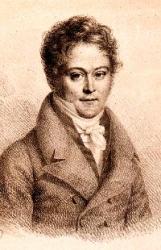
1771 - 1842 Person Name: Pierre M. F. de S. Baillot Composer (arr. from) of "OLIPHANT" in The Hymnal Pierre Marie François De Sales, born at Passy, France, Oct. 1, 1771, died in Paris, Sept. 15 1842. Instrumental composer, critic, and last great representative of the classical school of violin playing in Paris. Professor of the violin at the Conservatoire. His first master on the violin was an Italian named Polidori, but his real musical education began in 1780 under Sainte-Marie in Paris, and was continued in 1783 under Pollani, in Rome, where he was sent by M. de Boucheport; his playing was influenced also by Viotti, whom he heard in his tenth year. Baillot firs appeared in public in 1791, Viotti procuring him a place in the Théâtre Feydeau, which he soon resigned for an appointment in the Ministère des Finances using his musical talent merely as a recreation, In 1795, after studying compositions of Corelli, Tartini, Geminiani, Locatelli, Bach, and Handel he determined to become a professional musician, and made a successful debut in a concrto by Viotti, which secured his reputation and gained him a professorship of the violin in the newly opened Conservatoire, which he held till his death. He studied also harmony under Catel, and counterpoint with Reicha and Cherubini. Member of Napoleon's private band in 1802. He made a professional tour with the violoncello player Lamare in Russian in 1805-08, but the war brought him home; he gave concerts in the South of France, and started chamber music concerts in Paris in 1815, which gained him great reputation as a quartet player. In 1815-16 he made a second professional tour in Holland, Belgium, and England, becoming a member of the English Philharmonic Society, at one of whose concerts he played on Feb 25, 1816. Director of the band at the Paris Opéra in 1821-31; director of the Concerts spirtuels given at the Opéra, 1822, 1823, 1824; of the Royal Band from 1825; his last tour was made through Switzerland and part of Italy in 1833. Baillot's quartet playing is highly praised by Mednelssohn and Hiller. He had celebrated pupils. He assisted Rode and Kreutzer in compiling a work for the violoncello, and the Méthode de Violon, adopted by the Conservatoire (1803); with the exception of the Art du Violon, which is considered by Fétis the best elementary work of the kind (1834), his works are almost forgotten. His music is difficult. Among his published compositions are: 15 trios for two violins and bass; 6 duets for two violins; 12 études for violins; 9 concertos; Symphonie concertante for two violins, with orchestral accompaniment; 30 airs variés; 3 string quartets; Sonata for pianoforte and violin; 24 préludes in all keys, and several smaller compositions for the violin.
Cyclopedia of Music and Musicians by John Denison Camplin, Jr. and William Foster Apthorp (Charles Scribner’s Sons, 1888)
https://archive.org/details/cyclopediaofmusi01cham/mode/2up
Pierre Marie François de Sales Baillot

